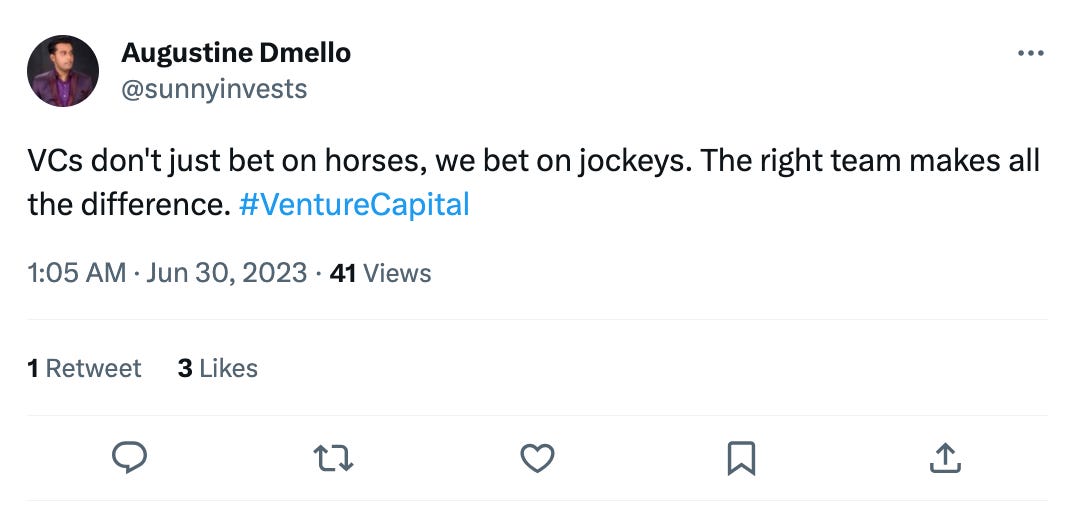Moneyball is a fortnightly newsletter from Koble exploring the limitations of human decision-making and their implications for startup investing.
We’ve spent two years developing our groundbreaking algorithms, which discover early-stage startups that outperform the market and predict their probability of success.
This week
🧠 Mental Model #18 – Mean Reversion – The Meanest Thing About Investing
📖 Investor reading – Silicon Valley is bracing for a Darwinian moment for startups – Fund of funds are starting to play a different role for venture LPs – Michael Lewis on the 20th anniversary of Moneyball
💬 Some tweets – Venture Capital hierarchy of needs – AI will transform a variety of industries, including venture capital – VCs don’t just bet on horses, we bet on jockeys
The Meanest Thing About Investing
Mean reversion is a statistical law that touches every part of our lives. And it’s a depressing, but ultimately inevitable feature of investing – a force that frustrates and humbles investors in equal measure.
Reversion to the mean says that asset price volatility and historical returns eventually revert to the long-run mean of the entire dataset. In other words, an event that is not average will be followed by an event that is closer to the average.
Behind this concept lies an inconvenient truth – human beings are brilliant pattern-seekers, but we are bad at processing random sequences. And since randomness plays such an instrumental role in our lives, we are left handicapped by our greatest skill.
Readers of this newsletter will know that we love a sports analogy. In his rip-roaring masterpiece “Fooled by Randomness”, Nassim Taleb identifies the “hot hand” in basketball as a neat example of how humans misperceive random sequences:
“It’s very likely in a large sample of players for one of them to have an inordinately lengthy lucky streak. As a matter of fact it is very unlikely that an unspecified player somewhere doesn’t have an inordinately lengthy lucky streak.
This is a manifestation of the mechanism called regression to the mean... in real life, the larger the deviation from the norm, the larger the probability of it coming from luck rather than skills.”
Taleb goes on to observe that this phenomena can be verified in stories of prominent, high-performing traders rapidly reverting to under-performance and obscurity. The fall from grace of Bill Gross’ AKA “The Bond King” is a case in point, but there are countless others.
Mean reversion dominates in activities where luck dictates outcomes. Solo sports like swimming, chess, and gymnastics are really games of skill, resulting in relatively consistent and predictable outcomes. This leads to single competitors dominating over long periods. Team sports are more exposed to luck and mean reverting. Cricket, basketball, and rugby teams don't tend to dominate for long.
As an investor, it’s easy to feel tyrannised by mean reversion. It’s something that’s baked into every asset class, seemingly impossible to escape.
Investing is about predicting and de-risking the future, but all too often, it is done retrospectively. Allocators tend to deploy capital based on historical performance, but mean reversion teaches us that this can be a grave error.
The risk lies ahead, but the rear view mirror is simply too tempting to ignore. So, mutual fund investors look at a fund’s track record to assess its ability to generate future returns. But the statistical likelihood is that historically successful funds will underperform, and unsuccessful funds will outperform.
In a paper entitled “The Harm in Selecting Funds That Have Recently Outperformed”, researchers found that over a 22-year study period, investors who chose funds with poor recent performance earned higher excess returns than those who chose funds with superior recent performance. Buying the “loser” mutual funds was a more profitable strategy than buying the “winner” mutual funds, by more than 2% per year.
Mutual fund performance reverts to the mean, and the boiler-plated small print was right after all – “past performance is no guide to future performance”.
Implications for investors
Venture capital is not immune to mean reversion.
Ramana Nanda, Sampsa Samila, and Olav Sorenson’s 2020 paper “The Persistent Effect of Initial Success: Evidence From Venture Capital” found that:
“There is a high level of performance persistence at the investment level across VC firms. However, the strength of this persistence in success rates attenuates over time.
In other words, venture capital performance exhibits mean reversion. Firms with the highest initial performance decline the most over time, while those with the lowest initial performance improve the most.”
Mean reversion is most pronounced at the extremes, compelling us to take extra care when we come across outstandingly good (or bad) results). Legendary research analyst Michael Mauboussin reminds us that:
“The first lesson is to recognize that when you see extremely good or bad results, they are unlikely to continue that way.
This doesn’t mean that good results will necessarily be followed by bad results, or vice versa, but rather that the next thing that happens will probably be closer to the average of all things that happen.”
The bigger (or more accurately, better) they are, the harder they fall.
This has negative implications for allocators pumping capital into household name venture funds with impressive historical returns. Perhaps they would be better looking at sector-specialist boutiques and firms with innovative new approaches to sourcing, screening, and closing deal flow?
The tyranny of mean reversion doesn’t mean that investors shouldn’t consider past performance as a criteria for committing capital. Track record is clearly an important data point. But instead of focusing on simple outputs (investment returns), we should scrutinise complex inputs (investment process) to understand how they drive performance.
Data science is a game-changer for helping us to understand the mechanics of fund returns. Quantitative approaches to venture capital enable us to understand how performance is generated at the atomic level, disentangling luck and skill.
Work with Koble
At Koble, we’ve spent two years developing our groundbreaking algorithms, which discover early-stage startups that outperform the market and predict their probability of success.
We’re working with forward-thinking angels, VCs, family offices, and hedge funds to re-engineer startup investing with AI. If that resonates, get in touch.
Investor reading
🧨 Silicon Valley is bracing for a Darwinian moment for startups in late 2023 – After a COVID-era boom, the data shows a dire situation for startups raising money in Silicon Valley. Investors say an “Extinction Event” is coming.
💰 Fund of funds are starting to play a different role for venture LPs – In an environment where funds are not seeing consistent support from their existing LPs, and there are more venture funds than ever, are Fund of Funds still relevant?
⚾️ Michael Lewis on the 20th anniversary of “Moneyball” – Moneyball came to represent more than a book about baseball – it turned into a placeholder for any strategy that uses an analytical style of thinking to solve a common problem.
Some tweets
Parting shot
“Never cross a river that is four feet deep on average.”
― Nassim Taleb
Regards from your [not mean] startup investing AI,
About Koble
Koble is re-engineering startup investing with AI, applying quantitative strategies that have disrupted public markets to early-stage startup investing.







